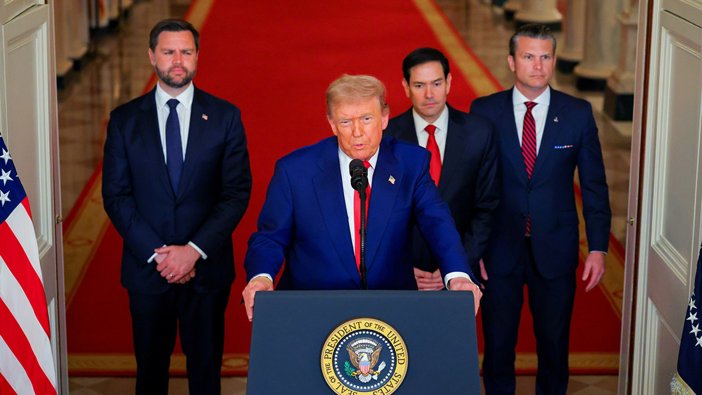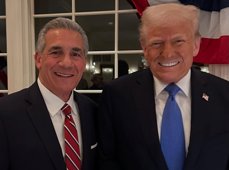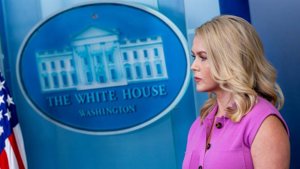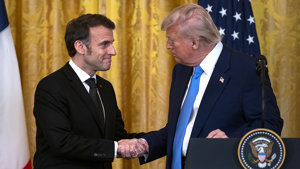
U.S. Airstrikes Obliterate Iranian Nuclear Facilities
U.S. forces obliterate key Iranian nuclear sites in a precision attack; Trump warns of greater strikes if Iran refuses peace.
U.S. Launches Devastating Strikes on Iran’s Nuclear Program
President Donald Trump announced on Saturday that U.S. forces had launched a series of massive, coordinated strikes against three of Iran’s primary nuclear sites: Fordow, Natanz, and Isfahan. The operation, aimed at destroying Iran’s nuclear enrichment capability, was described by Trump as a “spectacular military success” during a televised address to the nation. The president warned that unless Iran chooses peace, future attacks would be even greater and easier to execute.
"Tonight, I can report to the world that the strikes were a spectacular military success. Iran’s key nuclear enrichment facilities have been completely and totally obliterated," Trump said, emphasizing that the action was taken to neutralize what he called “the world’s number one state sponsor of terror.” He added, "If Iran does not make peace, future attacks will be far greater and a lot easier. There are many targets left. Tonight’s was the most difficult of them all, but if peace does not come quickly, we will go after those other targets with precision, speed and skill."
Deception and Precision: How the Strikes Unfolded
The surprise attack involved American B-2 stealth bombers delivering bunker-buster bombs to the underground Fordow site and thirty Tomahawk missiles launched from U.S. submarines targeting Natanz and Isfahan. Reports suggest the Pentagon used misdirection, deploying bombers in a way that misled observers and concealed the operation’s true timing and scope. All U.S. planes returned safely after the strikes.
Senior U.S. officials confirmed that Israel and Congressional leaders were notified ahead of the operation. Israeli Prime Minister Benjamin Netanyahu, in a statement, praised Trump’s decisive action, saying, “Your bold decision to target Iran’s nuclear facilities… will change history. America has done what no other country on Earth could do.” Trump credited the U.S. military, congratulating the “great American patriots who flew those magnificent machines tonight.”
For years, Trump has stated that he would never allow Iran to obtain nuclear weapons, a stance he reiterated throughout his presidency and the 2024 campaign. The president’s decision came after Iran withdrew from planned nuclear talks in Oman and as intelligence suggested that Iran’s program was advancing rapidly. The attack follows pre-emptive Israeli strikes that targeted Iran’s nuclear and missile infrastructure earlier in June.
Rising Regional Tensions and Global Security Risks
The operation has heightened fears of retaliation against U.S. forces stationed throughout the Middle East. Iran and allied groups, including Kataib Hezbollah in Iraq, have issued warnings that American troops and bases could be targeted in response to U.S. intervention. The region hosts more than 40,000 U.S. personnel, with major military installations in Iraq, Jordan, Kuwait, Qatar, Bahrain, and the United Arab Emirates.
Iran’s Supreme Leader, Ayatollah Ali Khamenei, previously warned that any U.S. military intervention would bring “irreparable damage.” After the 2020 killing of Iranian General Qassem Soleimani, Iran launched missile attacks on bases housing U.S. troops, resulting in casualties. U.S. officials are monitoring the situation closely, bracing for possible retaliatory strikes on American assets.
President Trump, while congratulating U.S. and Israeli forces, issued a stark ultimatum: “There will be either peace or there will be tragedy for Iran, far greater than we have witnessed over the last eight days.” He added that Secretary of Defense Pete Hegseth and the Chairman of the Joint Chiefs of Staff Dan Caine would provide further details at a press conference. The White House maintains that the action was taken only after Iran refused negotiations and continued its nuclear escalation.
As the world reacts to the sudden escalation, uncertainty hangs over the region. The U.S. administration insists that its goal remains peace and the complete prevention of a nuclear-armed Iran. However, with threats of retaliation mounting and tensions at a boiling point, the potential for further conflict remains high.






